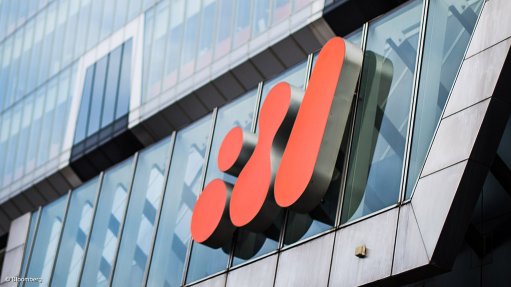
Photo by: Bloomberg
PERTH (miningweekly.com) – Mining giant BHP Billiton on Tuesday said that its interim profit had nearly halved, as the prices of the group’s main commodities slumped in the past six months.
BHP posted a 47.4% year-on-year decline in group profit for the half-year ended December 31, to $4.27-billion, from $8.12-billion a year earlier. Revenue dropped by 11.9% year-on-year to $29.9-billion.
The underlying attributable profit declined by 31% to $5.35-billion.
The group is offsetting the lower commodity prices by reducing its capital and exploration expenditure and by increasing its focus on efficiency. BHP announced on Tuesday that it would cut back on capital spending even more in the 2015 financial year, slashing its guidance by 15% to $12.6-billion.
“We started to prepare for a sustained period of lower prices almost three years ago by increasing our focus on efficiency and lowering our investment. Since then, we have achieved annualised productivity gains approaching $10-billion and reduced capital spending by almost 40%,” BHP CEO Andrew Mackenzie said.
He reported rapid improvements across all the group’s major businesses, with costs at the iron-ore division dropping nearly 29%, to $20/t in the last six months alone.
“The push for productivity must continue and our proposed demerger will be a catalyst for further progress. Simplification will ensure BHP Billiton’s organisation, systems and processes are dedicated to its core assets, allowing us to further improve their productivity,” he added.
The spin-out South32 company, which would consist of some of BHP’s aluminium, coal, manganese, nickel and silver assets, would benefit from a dedicated management team that would tailor a strategy suited to the company’s $16-billion portfolio.
Meanwhile, Mackenzie pointed out that despite the significant fall in the prices of the company’s main commodities over the past six months, the group’s margins had remained healthy, with free cash flow increasing.
Group production during the half-year ended December increased by 9%, with records achieved at eight operations, across five commodities. The increases resulted from productivity-led volume efficiencies, as well as the ramp-up of major projects, including the Jimblebar iron-ore project, in the Pilbara.
Iron-ore production increased by 16% during the half-year, to a record 113-million tonnes, with the Western Australian production increasing by 15%, contributing a record 124-million tonnes on a 100% basis.
Total petroleum production increased by 9% during the period under review, to a record 131-million barrels of oil equivalent. The major noted that a 24% increase in liquids production to 62.1-million barrels of oil equivalent, was supported by a 71% increase in onshore US liquids volumes and a strong performance at both the Pyrenees and Atlantis assets.
Copper production for the interim period decreased by 2% to 813 000 t, as the Escondida operation, in Chile, delivered lower production resulting from water restrictions, two days of industrial action and a power outage.
Metallurgical coal production increased by 21% to a record 26-million tonnes, while energy coal production decreased by 3% to 36-million tonnes.
Mackenzie noted that despite the falling commodity prices, BHP remained confident about the outlook for the company.
“We have the best quality assets and operating capability, a deep understanding of global markets, a portfolio of very high return growth projects, a strong balance sheet and offer outstanding cash returns to shareholders.
“The demerger will allow us to continue the process of building an organisation that is truly unique in our sector, and one that is well positioned for success in the face of ever-increasing volatility.”